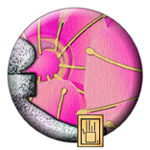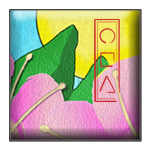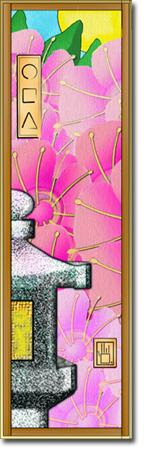On The Way: The Daily Zen Journal
Wake-up Sermon – Part 4
Bodhidharma (440-528)

Without the mind there’s no buddha means that the buddha comes from the mind. The mind gives birth to the buddha. But while the buddha comes from the mind, the mind doesn’t come from the buddha.
Just as fish come from water, water doesn’t come from fish. Whoever wants to see a fish sees the water before he sees the fish. And whoever wants to see the buddha sees the mind before he sees the buddha.
Once you’ve seen the fish, you forget about the water. And once you’ve seen the buddha, you forget about the mind. If you don’t forget about the mind, the mind will confuse you. If you don’t forget about the water, the water will confuse you too.
Mortality and buddhahood are like water and ice. To be afflicted by the three poisons is mortality. To be purified by the three releases is buddhahood. That which freezes into ice in winter melts into water in summer.
Eliminate ice, and there’s no more water. Get rid of mortality, and there’s no more buddhahood. Clearly, the nature of ice is the nature of water. And the nature of water is the nature of ice. And the nature of mortality is the nature of buddhahood.
Mortality and buddhahood share the same nature; it’s only because of the delusion of differences that we have the words mortality and buddhahood. When a snake becomes a dragon, it doesn’t change its scales. And when a mortal becomes a sage, he doesn’t change his face. He knows his mind through internal wisdom and takes care of his body through external discipline.

Mortals liberate buddhas and buddhas liberate mortals. This is what’s meant by impartiality. Mortals liberate buddhas because affliction creates awareness. And buddhas liberate mortals because awareness negates affliction. There can’t help but be affliction. And there can’t help but be awareness.
If not for affliction, there would be nothing to create awareness. And if not for awareness, there would be nothing to negate affliction. When you’re deluded, buddhas liberate mortals. When you’re aware, mortals liberate buddhas.
Buddhas don’t become buddhas on their own. They’re liberated by mortals. Buddhas regard delusion as their father and greed as their mother. Delusion and greed are different names for mortality. Delusion and mortality are like the left hand and the right hand. There’s no difference.

When you’re deluded you’re on this shore. When you’re aware you’re on the other shore. But once you know your mind is empty and you see no appearances, you’re beyond delusion and awareness.
And once you’re beyond delusion and awareness, the other shore doesn’t exist. The Tathagata isn’t on this shore or the other shore. And he isn’t in midstream. Arhats are in midstream, and mortals are on this shore. On the other shore is buddhahood.
Someone who understands the teachings of sages is a sage. Someone who understands the teachings of mortals is a mortal. A mortal who can give up the teachings of mortals and follow the teachings of sages becomes a sage. But the fools of this world prefer to look for sages far away. They don’t believe that the wisdom of their own mind is the sage.

The sutras say, “Among people of no understanding, don’t preach this sutra.” And the sutras say, “Mind is the teaching.” But people of no understanding don’t believe in their own mind or that by understanding this teaching they can become a sage.
They prefer to look for distant knowledge and long for things in space, buddha images, light, incense, and colors. They fall prey to falsehood and lose their minds to insanity.
The sutras say, “When you see that all appearances are not appearances, you see the tathagata.” The myriad doors to the truth all come from the mind. When appearances of the mind are as transparent as space, they’re gone.
Our endless sufferings are the roots of illness. When mortals are alive, they worry about death. When they’re full, they worry about hunger. Theirs is the Great Uncertainty. But sages don’t consider the past. And they don’t worry about the future. Nor do they cling to the present.

From moment to moment, they follow the Way. If you haven’t awakened to this great truth, you’d better look for a teacher on earth or in the heavens. Don’t compound your own deficiency.
Excerpted from The Zen Teaching of Bodhidharma – trans by Red Pine 1987





“To become a sage, you have to love the way of the sages.” Paraphrasing a line from practice can sometimes miss the mark, but the essence is here.
Just understanding what it is to be a sage can still leave us without the sense of commitment to become one with the actions of a sage.
Understanding is still a step removed from action, and it is too easy to think our understandings are the actuality of the Way, rather than part of what separates us from it.
Bodhidharma sounds like Lao Tzu here, and Zen has many aspects that feel like the watercourse Way of Taoism. Remove the trappings from Zen, the dogma that accrues with any spiritual teaching, and the essence is quite bare of extras.
“To find a buddha, all you have to do is see your nature.”
And that process involves turning the light back inside. Simple sounding, and so elusive at the same time. Just don’t stop anywhere suffering the complacency of just another “understanding.”
With Enthusiasm,
Elana, Scribe for Daily Zen